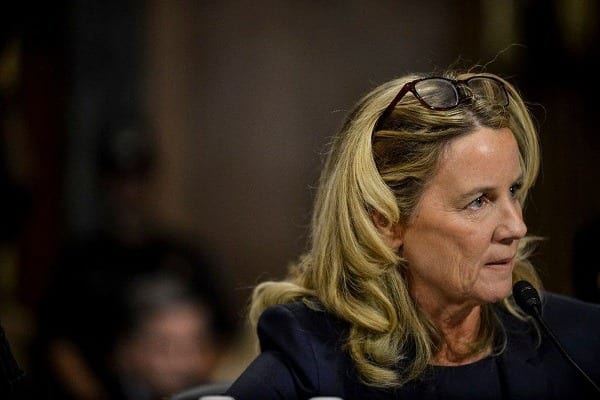Married at First Sight contestant, Sam, plants an exaggerated kiss on his new wife Lizzy’s cheek. He’s been uncontactable for days after walking out on their honeymoon to attend the funeral of his ex-partner’s mother.
Lizzy is understandably mad and confused at his unannounced arrival at a dinner party for the show’s couples after being MIA – but Sam calls her emotional, telling her to ‘relax’ and ‘just breathe’.
“You can’t just carry on – you can just talk to me like a human being. How old are you? We’re adults,” Sam condescends Lizzy for expressing her annoyance.
“You’re being ridiculous.”
Sam’s bemused smirk gives him away – he is hardly invested in his relationship with Lizzy, despite fake-marrying her less than a week earlier in a very public ceremony.
His behaviour constitutes what’s known as gaslighting, in which a person manipulates another person, by psychological means, into doubting their own sanity.
Instead of accepting responsibility for his failed communication, Sam attempts to manipulate Lizzy into feeling unreasonable for expecting a veritable stranger to keep in touch during a sad personal experience. After all, he says, he didn’t even have her phone number.
Women remain the most likely targets of gaslighting; it’s a commonly used tactic to dismiss women as disproportionately emotional in situations, and to discredit their point of view. In this article, Matthew Zawadzki, PhD explains how it works:
“‘Emotional’ is a term used to label women whom you don’t want to have a voice in a situation. When a couple is having an argument, even if a woman has a well-thought-out reason for being upset, a guy might say, ‘You’re just being emotional.’ It’s a way to discredit her instead of having to listen; the words ‘you’re acting crazy’ really mean ‘I don’t have to pay attention to you.’”
Gaslighting is a form of emotional abuse.
It’s a strategy used by abusers, who, over time, cause their partners to experience self-doubt, seriously impacting their confidence and ability to make decisions.
In this article, Belinda Cox, Community and Partnerships Program Manager at Micah Projects in Brisbane, explains the process:
“Domestic violence is an ongoing campaign of one person exerting their power and their control over another with the intent to cause fear, and to [control] that person. It’s not an incident, it’s not even a series of incidents, it’s a much more complex dynamic than that,” she says.
“People just see domestic violence as these separate ‘incidents’, they don’t understand what happens in between. They don’t understand the manipulation and the gaslighting and the coercive control.”
Gaslighting is nothing new, but in an era where President Donald Trump labels much of mainstream media’s unfavourable coverage of him ‘fake news’, it’s become a cultural phenomenon.
In fact, gaslighting is one of President Trump’s most commonly used strategies to dismiss political opponents, facts and events when things don’t go his way.
Trump has a long history of gaslighting women, including describing former White House aide Omarosa Manigault Newman as a ‘dog’ and a ‘crazed, crying lowlife’ after she claimed he used racist slurs to demean African Americans.
Trump has gaslighted all twenty-two women who have publicly accused him of sexual misconduct by dismissing each victim as a ‘liar’, despite video evidence of him bragging about attempting to have sex with a married woman and making other lewd comments (including the infamous ‘grab them by the pussy’ line).
Trump, however, is not the only powerful man trying to discredit women through gaslighting.
Dr Christine Blasey Ford was subject to death threats after accusing Brett Kavanaugh (then a Supreme Court nominee) of sexually assaulting her when they were both drunk at a high school party.
In a transcript of an interview, Kavanaugh vehemently denies the claims, saying that he remained a virgin until after college and that he never drank alcohol to the point of blacking out.
Kavanaugh’s own testimony, however, contradicts statements from his high school and college friends that he drank heavily and four more testimonies from people who accused Kavanaugh of sexual misconduct.
(THREAD) The GOP claim that there’s no corroboration of Dr. Ford’s allegation that Kavanaugh sexually assaulted her is a lie. Corroborating evidence—evidence that tends to support a proposition—already exists. I’ll detail as much of it as I can. I hope you’ll read on and RETWEET. pic.twitter.com/2vvOo3ELtZ— Seth Abramson (@SethAbramson) October 1, 2018
Despite questions about Kavanaugh’s ability to remain impartial after struggling to control his anger during a Senate judiciary committee hearing on the allegations of misconduct, he was elected to the Supreme Court. His appointment discredits the veracity of the five compelling allegations of sexual misconduct levelled against him, even though he likely lied about seminal aspects of his testimony.
Gaslighting women is not only a way of dismissing their perceptions and feelings, but also undermining their experiences.
When Brett Kavanaugh addressed the senate committee hearing, he acknowledged that Dr Ford may have been a victim of sexual assault ‘at some point’ but denied the only experience on which she so courageously staked her professional and personal reputation.


